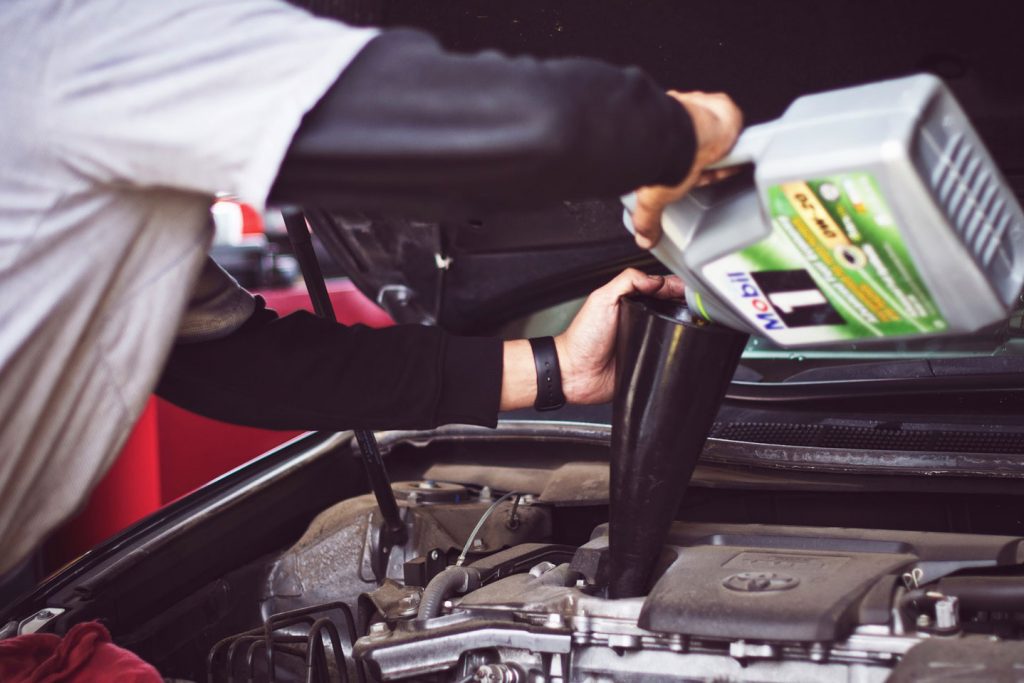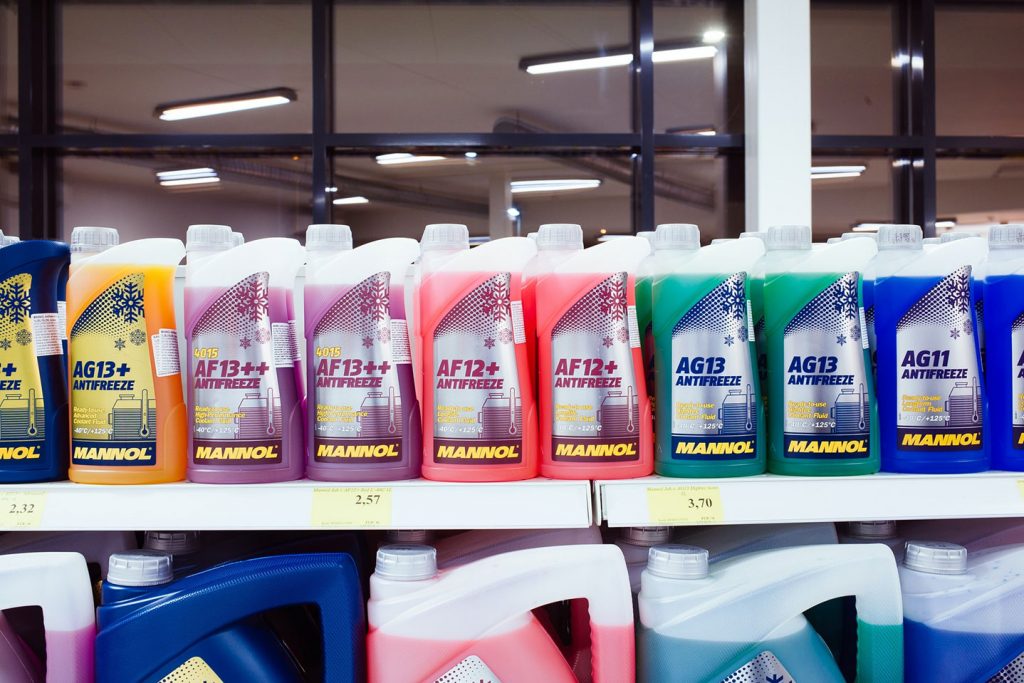Types of RV Antifreeze
Before going too much further, let’s get some quick clarifications on the types of RV antifreeze out there.
Ethylene glycol antifreeze uses alcohol as its main anti-freezing constituent. Ethylene glycol is a harmful and toxic chemical that is very dangerous, sometimes even fatal, to consume. Because of this, fewer and fewer RV and boat owners choose to winterize their rigs with ethylene glycol every day.
Propylene glycol is the most popular type of antifreeze used to winterize an RV. This is because propylene glycol is non-toxic in small quantities, making it safe to pump into an RV fresh water tank and plumbing lines. It is also non-flammable, meaning it is shelf-storage safe.
If you want to know more about antifreeze toxicity and how to use this product safely, check out this entire article I wrote on the subject.
Warning: NEVER consume any antifreeze. Toxic or non-toxic, antifreeze is still a chemical solution that can be dangerous or fatal if consumed in large quantities. Don’t drink the forbidden juice.
Also, you may be wondering what exactly RV antifreeze is and why you would ever need to use it. If so, give this video on RV winterization a watch and find out what RV antifreeze is used for:
How to Dispose of RV Antifreeze
This may come as a surprise to many people, but one of the safest ways to dispose of RV antifreeze is by simply pouring it down a sink drain in a house.
But won’t this just release the antifreeze into the environment and water supply? Usually, no.
The majority of plumbing systems in major cities and towns lead to a water treatment facility. At these facilities, waste water from our homes is treated and purified, so it can be safely released back into the environment without taking any of the soaps, chemicals, or human waste with it.
If the plumbing system in your home leads to such a facility, then you can safely dispose of your RV antifreeze this way.
Keep in mind that sink drains and storm drains are not the same and do not lead to the same places. Do not pour antifreeze into storm drains as it will likely flow directly into a stream or ocean.
When Not to Pour Antifreeze Down A Drain
There are some scenarios in which it would not be a good idea to pour your excess antifreeze into your house’s plumbing system.
Many people living in rural areas of the country utilize underground septic systems in order to safely dispose of waste water from their homes. A septic system works by first collecting the waste water from your house in a large underground tank.
Once stored in the tank, solid human waste and other solid biodegradable materials begin to break down and decompose, as liquid waste is slowly released into what is called a drainage field. The drainage field is underground and has the effect of filtering wastewater through soil, sand, and rocks as it re-enters the natural water table.
So, with that in mind, pouring antifreeze into a septic system is hardly different from pouring it directly onto the ground. Once the antifreeze travels through the septic tank and into the drainage field, it has irreversibly polluted the natural environment.
Where Else to Dispose of RV Antifreeze
Many automotive shops can dispose of RV antifreeze for you, sometimes for free, sometimes for a small fee. Automotive shops produce many types of chemicals that are regulated in the ways they can be disposed of. These shops have the connections and resources to safely get rid of antifreeze for you.

The safest option for proper RV antifreeze disposal is taking it to a hazardous waste management facility. These facilities are typically government operated, and will take volatile chemicals off your hands and dispose of them in a way that doesn’t harm the environment. Some of these facilities are free to use, some charge per weight, and some by volume.
Personally, I always take antifreeze and other chemicals such as motor oil and paint to these facilities for disposal. This way I rest easy knowing I am not contributing to the constant pollution of our environment with my waste chemicals.
Can RV Antifreeze Be Poured On the Ground?
No. It may be tempting to just pour your RV antifreeze directly onto the ground and let it seep into the soil. For a multitude of reasons, this is a dangerous and inconsiderate way to dispose of RV antifreeze.
Harm to Animals
Both automotive antifreeze and RV antifreeze smell and taste sweet to most mammals, including house cats and dogs. If antifreeze is dumped on the ground, cats and dogs will likely be attracted to it and if possible, lap it up.
This is bad news because antifreeze, even the “non-toxic” propylene glycol kind, is very toxic to cats and dogs. If a very large dog were to drink a small amount it might be ok, but if this happens, I would suggest visiting a veterinarian as a precaution. If a cat or small dog is able to drink any, it will likely be fatal.
Take extreme precautions in order to prevent your animals (and human children) from accessing any antifreeze. Keep RV antifreeze on very high shelves, or consider storing it in a locked chemical cabinet.
Harm to Plant Life
RV antifreeze should be considered just as toxic to plant life as it is to animals and humans. If antifreeze soaks into the soil that is supporting plant life, the chemicals will be absorbed into the plants through their roots and can result in a variety of fatal plant diseases.
Some food crops, like corn and soybeans, are quite susceptible to harm from ethylene and propylene glycol. If you live in a rural area and are doing automotive or RV maintenance, make sure you are performing the work far from any food crops to ensure there is no chemical contamination in food.
Groundwater
For those of you that do live in rural areas, there is a strong likelihood that your water is being supplied by wells. These wells are dug down and penetrate into what is called the “water table”, which is a term that refers to the mass of water that is stored underground.

The water stored in water tables can be very susceptible to contamination from human activity. Because the water in these systems is stored in a layer of soil, sand, and rocks, chemical pollutants that are dumped on the ground will seep down through that sediment and enter the water table.
By dumping RV antifreeze on the ground, you can pollute a large area of well water and pose a threat to the health of the humans and animals that use that well for drinking water. You also risk damaging crops that are irrigated with water from water tables.
Permafrost
A vast majority of the people reading this article are not going to have to worry about permafrost when it comes to the disposal of RV antifreeze. It’s still worth mentioning for people who do live around the arctic circles.
Permafrost is found in the cold northernmost and southernmost regions of the Earth. It is a layer of soil that is frozen solid year-round and is important to the ecological health of polar regions.
When dumped on the ground, the antifreeze will lower the freezing temperature of the soil, thus destroying the permanent quality of permafrost.
Conclusion
Winterizing your RV is an important chore to protect your camper’s health and the value of your financial investment. But it is crucial that RV antifreeze disposal is not approached flippantly. If precautions are ignored, the health of yourself, your pets, your community, and the environment are all put in jeopardy.
Don’t be a contributor to the needless pollution of our planet. Be smart and stay safe by being responsible with your antifreeze disposal.



